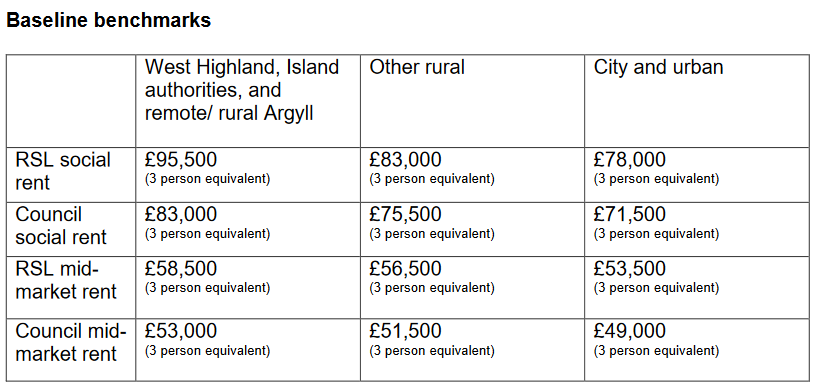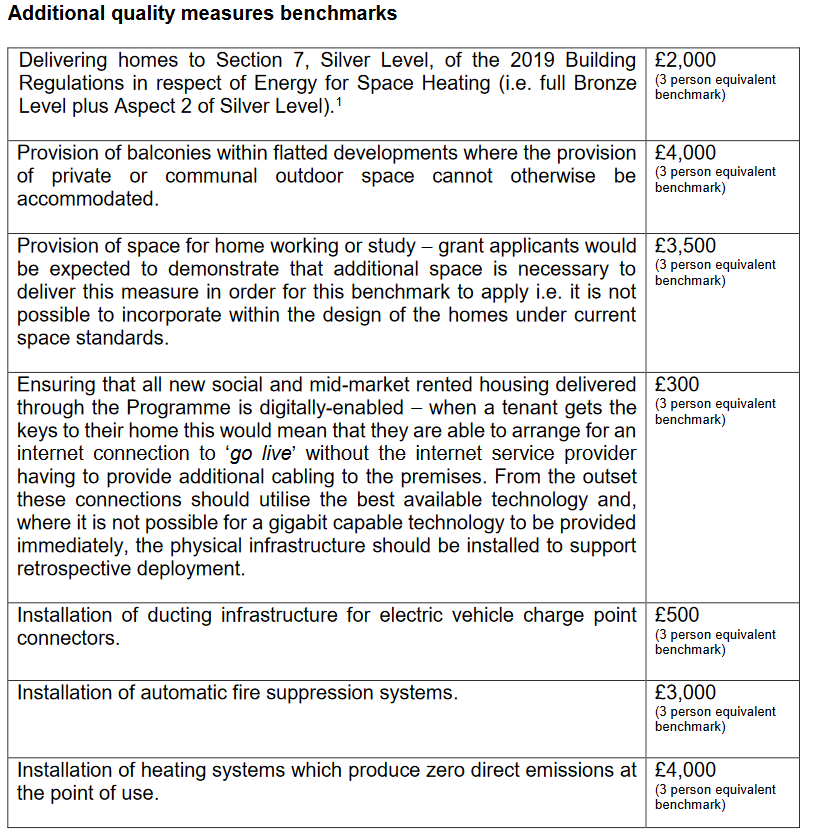Mandatory measurement concerns raised as government confirms affordable housing investment benchmarks
The Scottish Government’s review of affordable housing investment benchmarks has resulted in a “welcome” increase in investment, but “significant concerns” remain regarding the government’s decision on continuous improvement and procurement.

Setting out her decision in a letter to Affordable Housing Investment Benchmarks Working Group participants, cabinet secretary for social justice, housing and local government Shona Robison MSP reiterated the government’s position that benchmarks are not grant rates or grant ceilings and should have no bearing on an organisations’ rent setting processes.
She also confirmed that the new benchmarks will be introduced with immediate effect.
Ms Robinson wrote: “When applying for grant assistance to deliver affordable housing, councils and RSLs are required to self-certify that the amount of funding that they are requesting is the minimum required for a project to be financially viable for their organisation. The amount of grant requested is then compared with the applicable affordable housing investment benchmark to determine how the funding application will be assessed.
“Projects that can be delivered with grant funding at or below the relevant benchmark follow a streamlined application and approval process, with projects which are seeking grant funding in excess of the relevant benchmark following a more detailed value for money assessment. Benchmarks are not therefore grant rates or grant ceilings and should have no bearing on organisations’ rent setting processes.”

In line with the baseline benchmarks table (above), councils will now be able to apply for grant support to deliver homes for mid-market rent.
The cabinet secretary has decided to retain the current, flexible process for determining a project’s geographic classification – which uses the Scottish Government Urban Rural Classification, six-fold as the starting point, but which allows site specific geographic challenges to be recognised.
To support this process, the applicable geographic benchmark should be discussed and agreed ahead of grant applications being submitted, she added.
The new set of benchmarks will be adjusted to account for inflation on an annual basis, with the Scottish Social Housing Tender Price Index being used for this purpose. In order to ensure as robust data as possible, formal offers of grant will not now be issued until Housing Tender Returns are received (these should already be submitted at tender stage as part of the grant application process).

In line with views expressed during the review, Ms Robison said she wishes to maintain the principle of flexibility to award grant in excess of the relevant benchmark.
“Any grant applicant that requires grant in excess of the relevant benchmark should – with the support of the relevant local authority – continue to apply for this,” she said.
Ms Robison said has also asked her officials to convene discussions with the sector should any of the following situations arise:
- there be any variations to the Scottish Government specified quality standards for homes delivered through the Programme which would have a material impact on development costs
- evidence suggests that a disproportionate number of projects with an average unit size of less than three bedspaces are subject to detailed scrutiny
- evidence demonstrates that there is an increase in the number of applications requiring above benchmark grant funding, which is having a material impact on the speed of Programme delivery (excluding projects delivered in Glasgow for the reasons set out below) and/ or
- evidence suggests that the benchmarks are resulting in a disproportionately high number of projects meeting the benchmark level.
To aid any future discussions, arrangements will also be put in place to:
- monitor the number of tender approvals which are approved at, above and below benchmark on an annual basis (with the exception of projects in Glasgow given that the City Council (a) has a separate standard that it requires RSLs to deliver to and (b) undertakes detailed appraisals of all projects) – and publish this information in our annual Affordable Housing Supply Programme out-turn report
- analyse, for those projects that are approved above benchmark, the average person size of projects, as well as their geography and tenure (again with the exception of projects in Glasgow) – and publish this information in the annual Affordable Housing Supply Programme out-turn report, and
- monitor the cost of installing automatic fire suppression systems and heating systems which produce zero direct emissions at the point of use in affordable housing projects delivered through the Programme.
Elsewhere, Ms Robison has decided that the benchmark system will not apply to cases of second-hand purchases due to the varied strategies being adopted by local authorities alongside the varied market conditions.
“Decisions should therefore be agreed locally with relevant grant providers on whether individual applications for grant funding to facilitate second-hand purchases follow a streamlined application and appraisal process, or are subject to a more detailed value for money assessment,” she added.
Finally, the cabinet secretary has decided that the use of Scotland’s Housing Network’s ‘Value for Money in New Affordable Homes Tool’, and housing association participation in a programme of procurement support, should become a condition of grant funding.
Ms Robison said: “I have instructed my officials to take forward a continuous improvement effort with the sector – to be shaped and progressed in a genuine spirit of collaboration. There is however urgency around this and pressure to take further and more specific, tangible action in building an evidence-based continuous improvement system for affordable housing development.”
She added: “These are transformational elements that are available and capable of implementation now and I have therefore asked my officials to enter a period of discussion with the sector regarding their detailed implementation as a matter of priority.”
The Scottish Federation of Housing Associations (SFHA) said it welcomes the increased investment for delivering affordable housing and the continued clarification from the Scottish Government that benchmarks are not grant rates or ceilings.
Aaron Hill, SFHA’s director of policy and membership, said: “Since the release of the group’s report in September, the pressure on construction supply chains has worsened, and it is vital that benchmarks remain under review to meet these ever-increasing costs. Failure to do so could pose a threat to the scale and pace of delivery of the overall Affordable Housing Supply Programme. This is particularly important for Scotland’s rural and island areas which have historically faced higher development costs.
“We have significant concerns about the prescriptive nature of the decision to mandate the use of a series of procurement and measurement tools by housing associations. While we agree that there should be a rigorous process to ensure homes are of high quality, and the need to evidence value for money, this will place additional requirements on our members, which could detract from the important job of delivering more new affordable homes, and supporting tenants and communities.
“We will seek to engage constructively in discussions with the Scottish Government over the coming weeks around the implementation of these proposals. It is vital that our members are able to play their part in delivering the government’s target of 110,000 affordable homes by 2032.”
David Bookbinder, director of the Glasgow and West of Scotland Forum of Housing Associations (GWSF), concurred with the SFHA’s response on the government’s position that benchmarks are not grant rates or grant ceilings but argued that the use of private organisations as a mandatory funding condition is an “inconsistent” approach.
Mr Bookbinder said: “The one positive part of the outcome is the very clear statement that benchmarks serve only to dictate the appraisal route and are not grant rates or grant ceilings.
“This is especially important, given our belief that the benchmark levels are far too low for the Scottish Government to get anywhere near realising its aim that the majority of projects will come in at or under benchmark and not need detailed appraisal. This was the case even before the recent supply chain price hikes, and is even more so now.
“Our members are strongly committed to producing high quality housing, and GWSF remains keen to discuss with the Scottish Government and others how this can best be measured, including how better use can be made of all the information submitted to the SG’s own database (‘HARP’).”
He added: “But we are very disappointed that use of two private organisations’ commercial services is set to become a mandatory funding condition without consideration being able to be given to other providers or other approaches. This level of prescription is inconsistent with our status as independent organisations outwith the public sector.
“And, ahead of discussions on the implementation of these proposals, we would welcome clarification from the Scottish Government on what is meant by describing these services as transformational.
“Scotland has committed to a substantial and hugely welcome 10-year programme of new social housing, and we hope that many of our members will still be able to contribute to it, despite the very significant challenges which stand in their way at the current time.”
A COSLA spokesperson told Scottish Housing News: “Throughout the process of review COSLA has maintained the position that local authority projects should not face a higher level of scrutiny than RSL projects, and that the same benchmarks should exist for local authorities and RSLs. We welcome the Scottish Government’s position that benchmarks are not grant ceilings, however that adds to the confusion over why there would not just be one set of benchmarks for the whole social housing sector.
“Additionally, it is not appropriate for the Scottish Government, who are minority funders of the council delivered part of the programme, to set mandatory conditions for local authorities such as the use of a specific continuous improvement tool. Local authorities already have requirements in respect of this, and scrutiny is by local Elected Members who are directly accountable to tenants and communities.
“Local Government share the ambition of increasing the availability of social housing, but this must not be at the expense of current council tenants. COSLA shares the concerns expressed by the Local Government, Housing and Planning Committee with regards to the financial viability of the affordable housing supply programme. At the same time, investment is required to ensure existing stock is in good condition and to meet our decarbonisation and energy efficiency targets. The principal beneficiary of all housing investment must be tenants, and councils will continue to prioritise their needs.”
Housing secretary Shona Robison said: “Housing to 2040 – Scotland’s first long-term housing strategy – sets out our ambitions for how we want the housing and communities of the future to be, with actions on how to achieve that.
“The strategy shows how integral housing is to our objectives of tackling poverty and inequality, creating and supporting jobs, meeting energy efficiency and decarbonisation aims as well as fuel poverty and child poverty targets, and creating connected, cohesive communities.
“Our increased ambition to deliver 110,000 affordable homes by 2032 – with at least 70 per cent for social rent and 10 per cent in our remote, rural and island communities – forms part of that strategy, and the use of affordable housing investment benchmarks will continue to be a key administrative tool for delivering on this ambition.”







